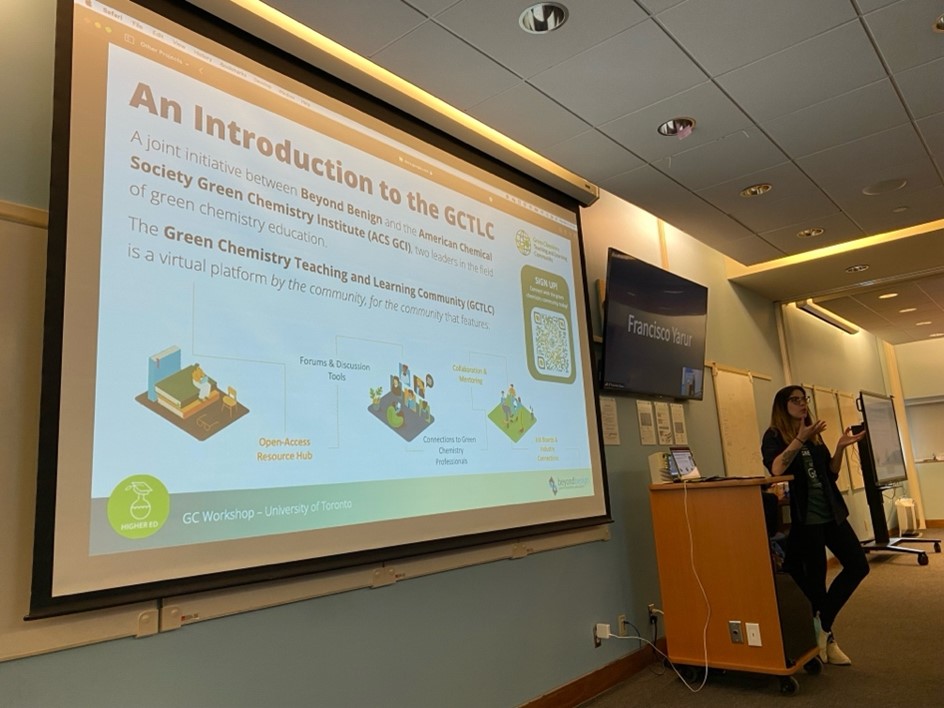By Alicia Battaglia, Graduate Student and Education and Outreach Coordinator of the Green Chemistry Initiative at the University of Toronto
Goal of the Workshop
The goal of this workshop was to offer graduate students a chance to learn about green chemistry and discover practical methods for integrating it into their own research projects. Additionally, the workshop included discussions on alternative career paths in chemistry, such as opportunities in non-profit organizations.
Workshop Content
During the first portion of the workshop, participants engaged in an interactive session led by Dr. Juliana Vidal from Beyond Benign, focusing on practical applications of green chemistry that can be used in a research context, such as solvent selection, waste prevention, and energy conservation, to name a few. After learning about these resources, students collaborated in small groups to generate ideas on how to integrate these newly acquired tools and insights into their own research projects. This activity allowed students to gather a better understanding of the considerations that one needs to consider to call one’s reaction green. They realized that, in some cases, the electrical equipment (i.e. fumehoods, vacuum pumps, gloveboxes) were what weighted the most in terms of green chemistry.

After lunch, Jasmine Hong, a student representative from Green Chemistry McGill, shared insights on how to bring green chemistry to your own institution. She discussed several ways that you can engage your campus, such as getting your department involved (glove recycling program, GCC signing), starting your own student group (hosting events to engage student body), and making connections with other universities. Other participants can consider adopting these strategies at their own institutions.

Following this, participants took part in a career panel discussion featuring a variety of esteemed figures in the field of green chemistry, including Juliana Vidal (Beyond Benign, non-profit organization), John Warner (President and CEO of The Technology Greenhouse, recognized as the “father of green chemistry”), and Areej Nitowski (educational manager at MilliporeSigma, a leading global chemical corporation). The panelists shed light on their career journey, shared tips on the application process, and discussed a typical day in their profession. One of the most notable pieces of advice that the participants received was from John Warner, in which he stated that “the world needs excellent chemists.” He stressed the importance of collaboration, and that chemists should talk and work together with people in other disciplines (i.e. business, law) to more efficiently tackle today’s issues. Furthermore, Areej Nitowski recommended that students become more active in their local community, specifically interacting with high school students and showing them their passions and the importance of chemistry in today’s society.
Post-Workshop Feedback
After the workshop, a feedback form was sent to all in-person attendees to assess what participants enjoyed, as well as discover actionable ways in which we can improve the event for next year. When asked what part of the workshop participants found most interesting, 88% responded that the reaction activity before lunch was the most useful, with the career panel coming in second at 50%. When considering what aspect of the workshop could be improved, participants suggested that information on how green chemistry can be used for inorganic or polymer/materials fields would be valuable, as most of the examples focused on organic syntheses and processes. Overall, 75% of participants ranked the workshop as a 4 or above out of 5, with 5 being very satisfied, indicating that majority of participants enjoyed the event.
Concluding Remarks
Ultimately, this workshop aimed to address a key requirement within the realm of green chemistry: the absence of sufficient green chemistry education, particularly at the graduate level. Our objective was to bridge the gap between what is learned in undergraduate courses and industry by offering this vital green chemistry workshop tailored to graduate students, thereby narrowing the knowledge gap in this field.
Due to the event’s success and the favourable feedback from the attendees, we plan to hold this workshop annually in the future. Additionally, the workshop was recorded and posted on our GreenChemUofT Youtube Channel, ensuring that everyone has free access to the valuable content in the future.
